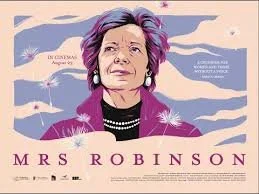Here's to you Mrs. Robinson
/
Saint Sister and Bono’s rendition of the documentary’s soundtrack “Women of the World”, created a relaxing ambience for the Moygownagh’s Ramblers contingent, who arrived at Ballina’s IMC Cinema on Monday night last, to view Mrs Robinson: A presentation which, in her own words, tells of Mary Robinson’s life achievements.
After viewing the documentary and reading several of Mrs Robinson’s interviews, given over many years: I have reached the conclusion that she always planned to succeed in whichever career path, be it law; politics, women’s rights or environmental issues she chose to follow. No one was going to stand in her way of reaching her ultimate objective.
She has accomplished many goals, received numerous accolades and endured much criticism for choices made, too many to list in this blog; therefore I have chosen some that have relevance to Irish society.
It is enlightening to perceive that a local woman from Ballina, whose ancestors are laid to rest in Moygownagh’s Old Cemetery met and negotiated with the world’s most renowned leaders of her day: Nelson Mandela; Archbishop Desmond Tutu, Kefi Annan, Pope John Paul II, Monarchies across the globe, together with so many more.
Many of Mary Robinson’s endeavours were first time events for an Irish President. I would imagine it was a first time event too, for An Taoiseach, Charles J, Haughey, to suffer the embarrassment of discovering that he had allowed Mrs Robinson to embark on a visit to the United Kingdom on a Head of State business trip with her intention of making a presentation to and receiving an Honorary Degree from Cambridge, without Mr Haughey realising that the Duke of Edinburgh was this College’s Chancellor. Mrs Robinson pushed the boundaries of bureaucracy and got to meet her Prince.
Thirty-one years after the event, it is a sobering thought, to realise that in 1993, Mary Robinson’s first visit to Northern Ireland and to Belfast in particular, could and did provoke a diplomatic rift between the Irish and British Governments.
Meeting Prince Philip gave Mrs Robinson the incentive to further build friendships with the British Monarchy, and improve Angelo-Irish relations. 1993 also saw her request permission from a different Taoiseach, to visit Buckingham Palace and therefore meet Queen Elizabeth II. Permission was granted on the understanding that it was a private visit. Public visits necessitated an invitation to be extended by the Irish Government for the Queen to visit Ireland. We weren’t quite there yet, not for another eighteen years actually.
Arriving at the Stately Home, on her 49th birthday, the Irish President was invited to take Tea with the Queen. This birthday party lasted all of thirty minutes. {Paddington Bear probably spent longer eating his Marmalade Sandwich during the Queen’s Platinum Jubilee Celebrations in 2022} None-the-less those tentative steps taken, by both figureheads would lead to greater political achievements, in the years yet to come.
Despite her colourful and illustrious career, with a mid-term popularity rate of 93%, some people observed it as disrespectful to her Country and the women of Ireland whom she professed to represent in pursuit of a more inclusive life, that Mary Robinson decided to resign from the Presidency of Ireland a few weeks short of term, to pursue a new role of High Commissioner for Human Rights in the United Nations. Quoting her own words from the movie “I was afraid that United Nations Secretary General Kefi Annan wouldn’t wait for me, that he’d appoint somebody else and I didn’t have any other option. I really wanted this job”. One wonders was there no room for, or no avenue of negotiation available in the circumstances, to allow her to complete her commitment to the People of Ireland.
Ironically, although he nominated Mary Robinson to become the United Nations High Commissioner for Human Rights, the then United Nations Secretary General, Kefi Annan, was unable to secure her the extended term of office she had requested, because Unite Nations member state officials, specifically those of the United States found her too outspoken in her views in the aftermath of the 9/11 atrocities.
Following on from her resignation at the United Nations, Mrs Robinson had many more roles to play most notably as Chairperson of the Elders, a group of twelve older state leaders, who work towards the alleviation of human suffering caused by many things including armed conflict. The Dandelion Project founded by Mrs Robinson is a women-led global campaign for climate justice.




